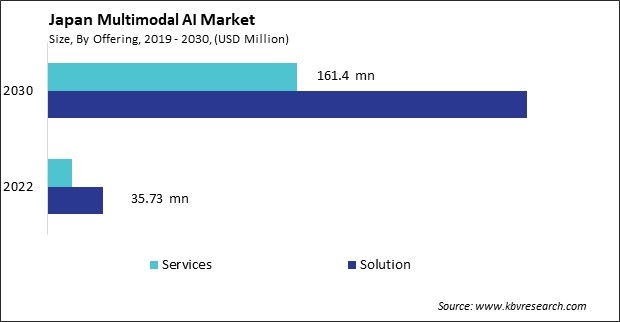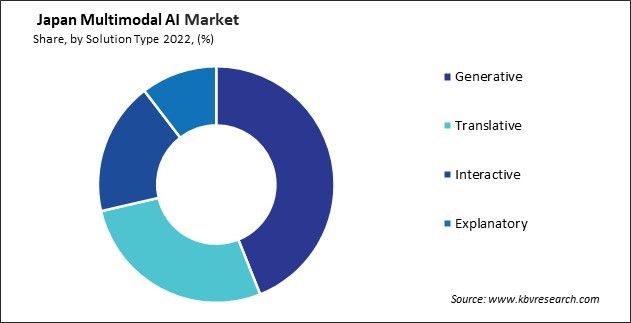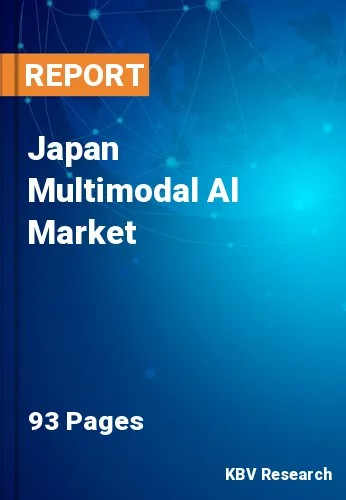The Japan Multimodal Al Market size is expected to reach $471.5 million by 2030, rising at a market growth of 32.4% CAGR during the forecast period.
Japan's multimodal AI landscape reflects a dynamic fusion of innovation, technology integration, and diverse applications across various sectors. With a culture deeply rooted in technological advancement, Japan has been actively exploring the potential of multimodal AI, leveraging its capabilities to drive progress in several key domains.

In the manufacturing and robotics sector, Japan's extensive use of automation integrates multimodal AI systems. Analyzing data from various sensors and cameras, these systems facilitate precise and efficient production processes. From quality control in manufacturing to intricate tasks in robotics, multimodal AI plays a pivotal role in ensuring accuracy and optimizing operational efficiency.
Moreover, Japan's focus on smart infrastructure and transportation fuels the integration of multimodal AI. In smart cities and transportation systems, multimodal sensors and AI-driven analytics aid in traffic management, autonomous vehicles, and enhanced safety measures. These systems analyze inputs like visual and sensor data for efficient and secure transportation solutions. Japan's national vision is for a data-driven, human-centric, next-generation society that uses AI, big data, and IoT, known as Society 5.0, that will provide appropriate solutions using such technology. Smart cities such as Kashiwa-no-ha and Fujisawa are already showing fundamental results of how smart the way forward is and are encouraging other investors from Japan and the rest of the world to understand why it is important to build a smarter future.
Japan's rich technological heritage and commitment to innovation continue to drive the evolution of its multimodal AI landscape. With a focus on precision, efficiency, and the integration of diverse data modalities, Japan stands at the forefront of leveraging multimodal AI to address complex challenges and drive progress across multiple industries.
The healthcare industry in Japan also showcases a significant interest in multimodal AI applications. With an aging population, there's a growing need for advanced medical solutions. Multimodal AI technologies are harnessed for medical imaging analysis, personalized patient care, and diagnostics. The integration of diverse data sources, including images and patient records, enhances medical decision-making and contributes to improved healthcare outcomes.
In Japan, by the year 2025, the entire generation born during the baby boom years of 1947-1949 will be 75 or older. According to current forecasts, this population is expected to reach 22 million, or one in four in Japan. At the recent Council on Economic and Fiscal Policy, the Government of Japan (GOJ) stated that starting in 2022, the growth rate of social security costs overtook previous expectations. As the elderly population rises, the workforce continues to decrease due to an overall population decline. This so-called "2025 problem" in Japan is imminent, with concerns about sharp increases in social security costs, medical and nursing care costs, and a shortage of nursing care workers.
Multimodal AI systems in Japan are revolutionizing medical imaging analysis. These systems offer more accurate and timely diagnoses by integrating data from multiple modalities such as MRI, CT scans, and patient records. This aids healthcare professionals in detecting diseases at earlier stages and personalizing treatment plans. Additionally, Japan's interest in remote healthcare services has seen the integration of multimodal AI for remote patient monitoring. Thus, the increasing use of multimodal AI in Japan's healthcare sector represents a significant shift towards personalized, efficient, and data-driven healthcare delivery. The ongoing development of these technologies holds the potential to enhance patient outcomes, optimize the allocation of resources, and propel medical research as well as education in Japan forward.
The Japanese government has been a pivotal force in fostering the development and adoption of artificial intelligence (AI), including multimodal AI, through strategic initiatives and comprehensive support frameworks. Their commitment to advancing AI technologies has significantly influenced Japan's technological landscape, fueling innovation and driving the widespread integration of multimodal AI across various sectors.
At the core of the government's efforts is the "Artificial Intelligence Technology Strategy," outlining policies and strategies to accelerate AI development. This strategy includes substantial investments, funding research and development projects, and creating conducive environments for AI innovation. The government actively supports AI-focused research institutions, universities, and businesses developing multimodal AI technologies through funding schemes, grants, and public-private partnerships.
Moreover, Japan's government has established AI-focused centers and innovation hubs, providing infrastructure, expertise, and resources for AI development. These centers act as catalysts, fostering collaboration between academia, industry, and startups, thereby accelerating the integration of multimodal AI into various applications. The government's support for AI has been instrumental in Japan's position as a leader in AI innovation through these concerted efforts.

Japan's landscape hosts a dynamic array of companies driving innovation in multimodal AI across diverse industries. Among these, Preferred Networks stands out as a leader in Tokyo's AI realm, focusing on deep learning research and applications. Their expertise spans robotics, autonomous vehicles, and healthcare, where multimodal AI is instrumental in enhancing decision-making and system autonomy.
Soramitsu, another notable company, specializes in both blockchain and AI solutions. While their primary focus is on blockchain technology, Soramitsu integrates AI into various applications, potentially involving multimodal AI for data analysis and security in blockchain systems.
Abeja is prominent in AI-driven data analysis, particularly catering to retail, manufacturing, and logistics sectors. Their AI technologies likely encompass multimodal data analysis, enabling businesses to derive insights and optimize processes by harnessing the power of diverse data sources.
In the robotics domain, Mira Robotics is an emerging player offering solutions for the service industry. Their AI systems may involve multimodal data processing, facilitating seamless human-robot interaction and service deployment, marking a significant stride in robotic assistance.
Miraisens specializes in haptic technology, aiming to create immersive sensory experiences. While their primary focus is on haptic feedback, there's potential for integration with multimodal AI to enhance user experiences, creating innovative sensory interfaces. These companies showcase Japan's vibrant landscape of AI innovation, exploring the convergence of multiple data modalities to drive advancements across industries like robotics, healthcare, data analytics, and sensory.
By Offering
By Type
By Technology
By Data Modality
By Vertical
Our team of dedicated experts can provide you with attractive expansion opportunities for your business.

